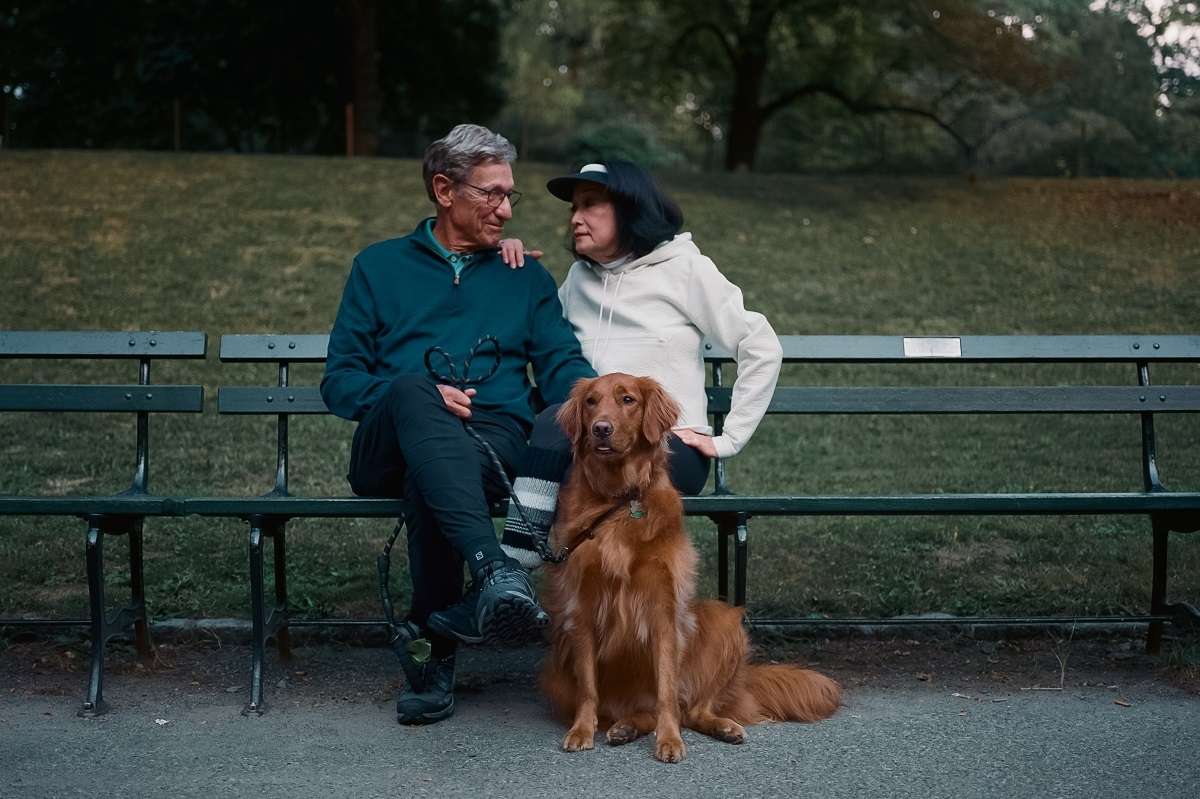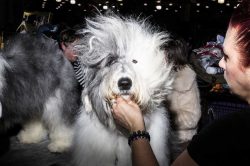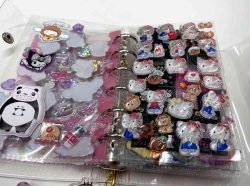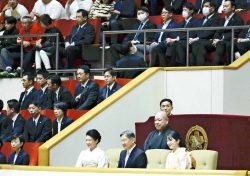
After years out of the limelight, Connie Chung, accompanied by her husband of 40 years, Maury Povich, and dog, Taxi, is back out in front to promote her memoir, “Connie.”
17:31 JST, September 17, 2024
NEW YORK – It didn’t take long for someone to spot Maury Povich on the street.
At the entrance to Central Park, a young woman in a white carriage gasped as she saw the tall, slender 84-year-old talk show host who had been America’s patron saint of paternity tests for more than 30 years. (She asked for a picture, of course, which he obliged.)
Slipping by unnoticed was his wife of nearly four decades, Connie Chung, dressed in black leggings and a white jacket. She wore a visor, not to disguise herself to passersby, but because at 78 she likes the effect of it – “It’s like an instant facelift,” she joked. The pair were taking their caramel-colored golden retriever, Taxi, out for a late-afternoon constitutional.
Further along, two police officers addressed Povich as he waited, Taxi’s leash in hand, to cross an intersection.
“I feel like I know you from somewhere,” one cop said, arms crossed over chest.
“That’s Maury Povich,” said his colleague.
“Oh, I was going to say Jerry Springer,” the cop said.
“What?!” Povich responded, his eyes raised high in (mostly) mock incredulity. Chung guffawed.
“Jerry Springer’s dead!” They cried in unison.
The scene is a reversal from the early days of their marriage, when Chung, the first Asian American to anchor any television news program in the United States, was on air at least six days a week delivering the news. Back then, Povich’s fame didn’t extend past D.C., where he hosted the political talk show “Panorama.” In fact, one of Povich’s favorite stories calls back to the time he, visiting Chung’s apartment in New York, introduced himself as “Connie’s husband” to her doorman. The attendant rang up her apartment, announcing, “Mr. Chung is here.”
Not that Chung minds not being stopped for photos. A self-proclaimed recluse, she swears by a mantra repeated in many late-night phone calls with Povich over the years: Take the work seriously, not yourself.
“I’ve been off the radar for so long,” Chung said. “I actually don’t know what people out there might be thinking or what it is they remember. Or do they even know my name?”
For the better part of the last decade, Chung has been working on her memoir, “Connie,” available on Tuesday. The book takes readers through the sweeping arc of Chung’s life, from the birth of her parents in China at the turn of the 20th century all the way through the 2023 revelation of the “Connie Generation,” referring to phenomenon of Asian American women named after the trailblazing anchor.
Chung is frank and funny throughout – coloring in a journalistic legacy that was complicated by celebrity, misogyny and sexism.
When I toured Povich and Chung’s prewar apartment in early September, some of the vast archives she had pulled from to tell her story were still out in the hallways, filed neatly into labeled plastic containers.
“She had every calendar from like, 1971,” Povich said. “She had all of her tapes, all her scripts.”
“She never threw anything away,” he continued. That may inspire awe in others – Povich, not so much.
“I hate it. There’s so much s—,” he grumbled.
When Chung and Povich married in 1984, they were seen by many as an odd couple. She was the serious, superstar news anchor, gazing steadfastly into America’s homes and delivering them the news of the day. Povich was lesser known, a journeyman news anchor who would eventually become the face of tabloid journalism as the host of the Fox TV show “A Current Affair.” (One of David Letterman’s favorite bits, when he would have Chung on his late-night show, was to “misremember” Povich’s name – calling him “Murray” or “Morley.”)
They are an odd couple in the more familiar ways, too: Chung is the neat one, the one who won’t rock the boat, the one who meticulously overprepares for public appearances. Povich is, in his own words, “a flinger of socks,” a natural adlibber with a penchant for bending the rules.
But they also share plenty: A wicked sense of humor and timing; as likely to poke fun of themselves as they are of each other. When one sings the other’s praises (and they do this, too, a lot), the other squirms, as though flattery were some buzzy cicada landing at their feet.
They loathe people with big egos and sharp elbows, having run into their fair share in television newsrooms. They are deeply devoted to their family. Whether they’re sitting on a daytime talk show couch or walking their dog, their hands search for each other.
And they both hail from Washington, D.C., a city they credit with the best of their years, and the best of their work.
Chung and Povich grew up in 1940s and 1950s D.C., a town of wide, tree-lined sidewalks, southern twangs and segregation. Povich, the son of renowned Washington Post sportswriter Shirley Povich, grew up in the stadiums and playgrounds of the city; a loud, confident and mischievous boy who, borrowing from Arthur Miller, “could get by on a shine and a smile,” as Povich wrote in his memoir.
Chung’s family lived in a White neighborhood, after her father managed to convince a landlord to rent to a Chinese family. Chung recalls there were beaches her family could not go to because of their race. But the D.C. of her childhood is an idyllic one nonetheless, quiet and peaceful and rife with small delights.
Every night in their respective homes, the Chung and Povich families gathered in front of their TV to watch Walter Cronkite deliver the evening news on CBS. Both of them dreamed of sitting at that desk.
The pair first crossed paths at WTTG-TV Channel 5, when Chung got her first journalism job as a newsroom “copyboy” before working her way up to newsroom secretary. Povich was the sports director there, as well as the host of live daytime talk show “Panorama.” By then he was already married with two young daughters.
“When I delivered Maury’s wire copy to his desk, I was lucky if I got a thank-you or a nod,” Chung writes in her memoir. Povich didn’t take note of Chung until the day a position opened up to be an anchorman’s news writer. Chung, seizing the opportunity, asked her boss to hire her for the job. Her boss, however, still needed a secretary – she would need to find her replacement, he told her.
“She walked out of the newsroom, up the stairs, across the street into the American Security Bank, looked at the first woman teller and said, ‘Do you want to be on TV? Come with me,’” Povich recalled. (He loves telling this story; “He always tells it a little wrong,” Connie said.)
The teller got the job, and so did Chung.
Povich didn’t witness the scene, but the story traveled quickly around the newsroom.
“That’s when most of us, I guess, paid attention,” Povich said.
“I’d never heard of anybody getting a job that way.”
Within a few months, Chung was an on-air reporter. Then, a year later in 1971, she joined CBS News’s Washington Bureau, part of the first wave of women on-air reporters the acclaimed news organization hired.
***
Connie and Maury don’t have a “Wall of Fame” – some staid mosaic of gilded award trophies, honorary diplomas and pictures with celebrity friends and colleagues. They have a “Wall of Shame,” and they were eager to show it.
“It’s hysterical,” Chung promised.
The Chung-Povich Wall of Shame is a collection of cartoons portraying Chung, Povich and their shows. There you’ll find cells from an episode of “South Park” lampooning “The Maury Show.”
“They … absolutely brutalized me,” Povich grinned.
There are several political cartoons depicting Chung’s 2001 interview with then-Congressman Gary Condit about Chandra Levy’s disappearance. Some sketches from Bugs Bunny co-creator Chuck Jones (“a big fan of Connie,” Povich said) and Chung’s favorite contribution: a greeting card with an image of her sat beside her CBS co-anchor Dan Rather on the front.
“When I think of Connie and Dan together, I think of us,” the inside reads. “I’m cute, smart and dynamic, and you’re kind of old.”
For better or worse, Chung’s strained relationship with Rather is a significant part of her story. When she landed in the anchor seat in 1993, it was a historic ascension – she was only the second woman to anchor an evening news broadcast (Barbara Walters was the first to shatter that barrier, in 1976), and the first Asian American to do so.
From the start, TV insiders, critics and audiences questioned how receptive Rather was to his new co-anchor. In “Connie,” Chung likens herself to “a bow around Dan Rather’s neck that would make him appear friendly and cuddly and normal.”
“But instead, it was I who ended up in a noose,” she writes.
The discomfort between the two was palpable, said Robert Thompson, a professor at Syracuse University, who still plays their live coverage of the OJ Simpson Bronco chase as part of his “History of Television” class.
“The little microaggressions that keep being tossed Connie’s way are so obvious to us today,” he said, referring to the way Rather appeared to condescend to Chung.
Chung puts it more bluntly in the book: “I felt as if Rather despised my presence.” Chung’s tenure as co-anchor ended after only two years, following a series of public setbacks that included her controversial interview with Newt Gingrich’s mother and backlash over her live coverage of the Oklahoma City bombing. (In the book, Chung shares accounts that suggest Rather helped orchestrate the latter.)
When Chung worked at CBS News’s Washington Bureau in the 1970s, she worked the political beat, “covering every burp and hiccup in government and politics,” Chung writes in her memoir.
She covered the Watergate hearings and chased down President Richard M. Nixon’s allies on stakeouts. Chung was part of the press corps that followed Nixon on official trips to Saudi Arabia and Communist Russia. She tailed Sen. George McGovern and Nelson Rockefeller on the campaign trail.
She brushed off constant come-ons from her male colleagues with brusque put-downs (“In your dreams” and “You’re not good looking enough”). Nor was she safe from the very people she was reporting on, including McGovern, who, Chung writes, tried to kiss her.
Her oversized work ethic didn’t cease when her father fell ill, making Chung, who still lived with her parents, her family’s primary breadwinner at the age of 26. It ratcheted up the pressure to succeed.
So when the opportunity came to make more money – and gain some autonomy – in Los Angeles, Chung took it.
***
When Povich, then single, crossed paths with Chung again, it was to be her “second banana” on Channel 2, L.A.’s local CBS station. Their on-screen reunion was brief – Povich was fired several months later when the station changed managers – but commiseration led to courtship.
Theirs was a casual affair – both were preoccupied with their careers, lived in separate cities and were transparent about dating other people.
In Los Angeles, Chung was a bona fide star – a fact that did not escape Povich when he would visit her at her home.
“[Warren] Beatty called frequently. So did Marlon Brando,” Povich said.
They enjoyed the freedom of living apart, even as their relationship became more serious. By the time they got married in 1984, TV news had begun reaching the peak of its popularity and Chung was a celebrity in her own right – her salary and her job prospects were fodder for tabloids, trades and legacy newspapers.
Chung and Povich still speak glowingly of that time, married but living in two different cities – New York for Chung, D.C. for Povich – “a perfect arrangement,” they both agreed. They would meet one night a week and eat in and, if Chung didn’t have to be on air the next day, drink some scotch.
“She decorated it,” Povich said of his D.C. apartment.
“Well, I wouldn’t call it decoration,” Chung replied. “I just bought you a sofa, a chair, a coffee table.”
“He was a disaster,” Chung said. Underneath her feet, Taxi, in her checkered collar, had fallen asleep. “A bachelor who had nothing.”
Nonetheless, “it was very, very exhilarating to see each other,” she said.
Meanwhile, at NBC and then CBS, Chung had become a household name. She was eager to pursue investigative work, covering government and institutions and holding them to account.
But news had changed. While Povich’s program, “A Current Affair” was derided by his contemporaries, network news brass sought to copy its winning formula – in Povich’s words, “celebs and crime, baby!”
Like other women journalists of the time, Chung was given the task of chasing down high-profile celebrity interviews and salacious “documentaries” with titles like “Scared Sexless.”
Chung feared those stories would ding her credibility as a serious newswoman – and they did. She noted that male anchors like Rather, Tom Brokaw and Peter Jennings were never asked to do them. But Chung felt she couldn’t risk saying no to a story, for fear of losing newsroom allies and opportunities.
Both Chung and Povich were at the forefront of seismic changes in the news industry. Their status as a celebrity couple drew increased attention; both were scrutinized and mocked for their work. And when, under pressure from CBS, Chung was forced to go public about their pregnancy difficulties, that was mocked, too.
Through it all, Chung and Povich soothed each others’ doubts and derided each others’ critics. They laughed at themselves.
“When celebrity became a part of television news, it tainted the process and tainted the business,” Chung said.
“The glory was wonderful, and I enjoyed it. But it did taint it.”
***
In 2024, Chung’s day no longer begins with the news, though she still keeps cable news running in the background – in case something breaks. (This despite her distaste for the “bloviators” that cram its programming.)
Each night, Povich pours himself a glass of Johnnie Walker Black on the rocks and saves the first sip for Chung. “I’m such a cheap drunk,” she quipped.
The trail Chung blazed has appeared to crumble behind her. News anchors are no longer household names; no longer the accompaniment to family dinners. Chung herself feels the medium has become “irrelevant.”
Celebrity had pushed her out of the kind of investigative reporting she loved best, though Povich is quick to remind her of her contributions.
“How many cosmetic surgeons hate you because you got silicone breast implants banned?” Povich said to her, referring to her 1990 report on CBS in which she talked to women whose implants had leaked silicone into their bodies.
Following the story, the FDA banned silicone breast implants; when they were reintroduced 14 years later, it was under more stringent regulations.
Those are the kinds of stories she’d like to be remembered for.
Years removed from that life, it’s been like “whiplash every day” to get ready for the release of her memoir.
Sure, there’s the matter of defining one’s legacy, but Chung had a more practical consideration for writing the memoir – “I really like the idea of earning a paycheck.”
Povich had heard this before.
“You always complained that you weren’t contributing financially for the last few years. And I remind you about supporting me when I had nothing,” Povich said.
Chung considered this, then continued.
“That’s part of the reason I wrote the book. I think I really have been sponging off Maury for many years,” she said. “I’m not happy about it.”
Top Articles in News Services
-

Prudential Life Expected to Face Inspection over Fraud
-

South Korea Prosecutor Seeks Death Penalty for Ex-President Yoon over Martial Law (Update)
-

Trump Names Former Federal Reserve Governor Warsh as the Next Fed Chair, Replacing Powell
-

Suzuki Overtakes Nissan as Japan’s Third‑Largest Automaker in 2025
-

Japan’s Nikkei Stock Average Alls from Record as Tech Shares Retreat; Topix Rises (UPDATE 1)
JN ACCESS RANKING
-

Univ. in Japan, Tokyo-Based Startup to Develop Satellite for Disaster Prevention Measures, Bears
-

JAL, ANA Cancel Flights During 3-day Holiday Weekend due to Blizzard
-

Japan Institute to Use Domestic Commercial Optical Lattice Clock to Set Japan Standard Time
-

China Eyes Rare Earth Foothold in Malaysia to Maintain Dominance, Counter Japan, U.S.
-

Japan, Qatar Ministers Agree on Need for Stable Energy Supplies; Motegi, Qatari Prime Minister Al-Thani Affirm Commitment to Cooperation























